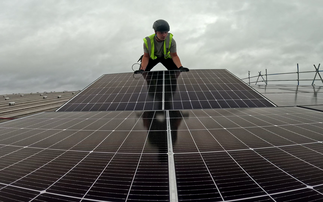EXCLUSIVE: Imminent review of solar support schemes expected to tilt market in favour of large rooftop installations, but move fuels fears among solar farm developers
The government is poised to announce a review of solar industry subsidies in a bid to accelerate the development of commercial scale rooftop installations and address concerns the recent boom in solar farm development could put pressure on the UK's clean energy budget.
BusinessGreen understands proposals are in the pipeline for changes to the subsidy regime for large and commercial scale solar installations, although precise details on the scale of the potential changes and whether they will affect the Renewables Obligation scheme, the feed-in tariff, or both subsidy mechanisms are yet to be confirmed.
Several separate industry sources indicated that they had been expecting an announcement on a new consultation for some time.
Government sources confirmed an announcement was imminent, adding that ministers were keen to bring forward changes that would support the recently launched Solar Strategy and its goal of delivering 20GW of solar capacity by 2020.
The Solar Strategy featured a commitment to accelerate the rollout of commercial scale rooftop solar installations on offices, factories, supermarkets, and public buildings, and as such the anticipated review is expected to look at whether changes to subsidies are needed to make investment in mid-sized rooftop installations more attractive. Industry insiders have been warning for several months that the government will struggle to realise its vision for a significant increase in commercial-scale installations without a rethink on subsidy levels.
"The solar strategy had a particular focus on commercial and industrial building mounted PV generation and we are keen to do more to support that sector," said a Whitehall source, adding that officials were looking at both financial and non-financial mechanisms for supporting the sector.
However, any celebration within the solar industry at the prospect of a boost for commercial scale rooftop solar projects is being offset by concerns about the timing and nature of such a boost and fears that the level of support currently on offer for ground-mounted solar farms is now under the microscope.
One industry source, speaking on condition of anonymity, said that after the Solar Strategy confirmed the government wanted to focus more on rooftop installations it was "only a question of when, not if, they were going to look at cutting the subsidy for solar farms".
Government sources refused to confirm whether it was planning to propose a reduction in the subsidy for solar farms, but BusinessGreen understands there are concerns within the Department of Energy and Climate Change (DECC) about the landscape impact of new solar farms and the extent to which the recent surge in solar farm development is eating into the limited Levy Control Framework subsidy pot.
Figures published this week from NPD Solarbuzz revealed that 124 large-scale solar farms have recently received the green light from planners in the UK in recent months, many of which are targeting completion in the next 12 months, while the government expects the UK to have around 4GW of solar capacity online by the end of the year.
One industry insider said the impact of any potential changes on solar developers would be determined by the scale of the cuts proposed and the timeline for introducing them. With the cost of solar technologies continuing to fall developers will be hopeful that they can respond to a modest reduction in subsidies, as long as they have sufficient notice.
However, there are concerns across the industry that any changes to the current policy regime that take affect this year could have a chilling effect on projects that are already in the pipeline, and may even trigger another legal challenge against the government over its handling of solar subsidies.
There are also fears that steep cuts, akin to those currently being proposed by some Conservative MPs for onshore wind farms, could effectively block new solar farm developments if they are brought into effect.
Industry sources expressed frustration at the prospect of further changes to subsidy schemes, which they warned could impact investor confidence in the sector. The proposed changes come despite the fact the solar industry continues to enjoy record levels of public support, with the latest DECC attitudes survey finding 80 per cent of people have a favourable view of the technology.
Responding to the latest reports, Paul Barwell, chief executive at the Solar Trade Association (STA), said the industry would be "disappointed" at the potential for a third review of the Renewables Obligation in less than three years.
"Investor confidence and market stability is absolutely essential in order to deliver sustained cost reductions for consumers and a healthy solar industry for UK plc," he said in a statement. "We are obviously on tenterhooks to see what changes DECC is proposing to make."
He added that the industry would be particularly concerned about the manner in which the shift in focus towards commercial rooftop installations is managed.
"We have been concerned that DECC's Solar Strategy seeks to shift solar to mid-scale rooftops when the UK policy framework is inadequate for these scales," he said. "We have been pressing for reforms to the user-friendly feed-in tariffs for nearly a year to address this, something that must now happen urgently. We hope DECC will announce a major increase in the amount of mid/large solar roofs that can be delivered under FITs... We are also concerned that any excessively hasty push for cheap solar will come at the cost of achieving quality in the solar farm industry, which is essential to retain public support."







